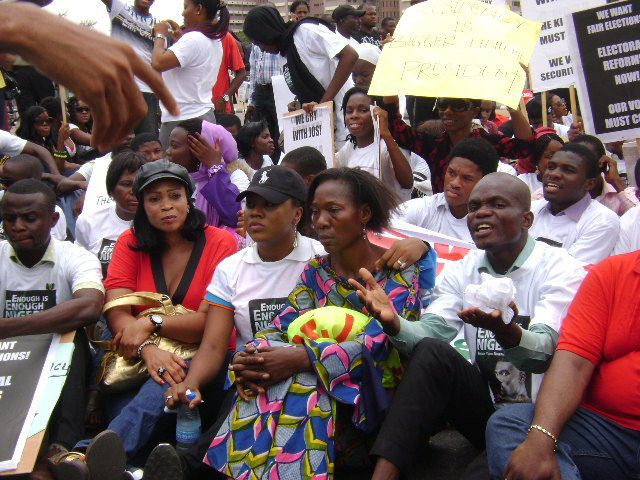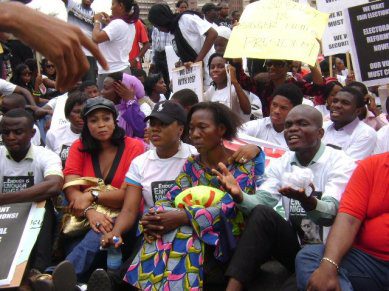National Issues
The Predicament Of Nigerian Youths -By Simon Abah


It has been said again and again that the older generation have refused to give
youths a chance to take a shot at governance, but while this may be true, how ready
are today’s youths to seize the moment to be of service to the nation like our
ancestors did?
An average Nigerian youth nowadays say he believes in the Creator “so much” and
cannot detach his activities, even political awareness, from his religious beliefs.
You begin to wonder if a country like China fights corruption by calling on the Most
High. That same youth does not have the constitution of the federal republic of
Nigeria at heart and is quick to interpret the doctrines of his religious books
above his country.
Ironically you expect that he would, as a godly person, denounce politicians when
they take part in malfeasance of the country’s wealth but he doesn’t.
“I am not biased” he says, “and not a card-carrying member of any political party,”
but his analysis as a self-professed non-partisan reviewer reflects opinions
promoting the candidacy of one contender to the detriment of the other without a
reference to the strength of the other as well, and hatred for people not like him
comes to him with ease, yet he isn’t partisan.
Times like this you begin to wonder how Mahatma Gandhi, Dr. Martin Luther King Jnr,
Mother Theresa and many others were able to fight shy of abhorring people from the
other side and winning for themselves friendships amongst various bodies of man.
Over 40 and unmarried (though marriage is not a measure of success), he sees himself
as a youth and blames his mother for his single status. Life for him comprises of
passing the buck and never accepting responsibility for obligations even if these
involve looking after blood relatives, when he is well able to do so.
He loves the easy side of life and does not miss out on the chance to go to watering
holes at noon and at sundown. If he is privileged to buy a car, he must exhibit it
on social media, which to the Nigerian youth spells success.
He finds it difficult to read a book and know world history. For these reasons, he
is easy to fool by the elite who use him as a thug during elections and further ask
him to root for secession if they do not win same elections. Why these elites do not
use their own children as thuggish front-runners, the youth does not bother to ask.
At graduate school, he is the first to say, “I earwigged that the other class
members contributed monies for lecturers and I was wondering if we could do the
same, so they would be nice to us.” This solicitation was not encouraged by the
lecturers even though most request it obliquely and others with vigour.
If you resist this appeal because of the nature of your nurture in good
undergraduate school, the youth would be the first to report to the teachers, that,
“my colleagues are not cooperating,” thereby hanging them out in the open to dry
before these instructors.
Social interaction for this youth on campus is all about cossetting ladies and
walking with arms encircling them, in a romantic manner publicly. He cares for
nothing and sees the campus as a place where attire is sloppy, even for formal
occasions. He would buy his wedding clothes abroad and showboat this further by
stating the origins of his attire on the wedding brochure.
Aspiration to higher learning is all about certification for this youth and if he is
fortunate enough to travel overseas, he quickly forgets about the love of country
and never uses knowledge acquired out there for the growth of his fellow countrymen.
He wonders why those who like him are beyond his country’s borders should be
concerned about national statehood.
Put the youth on a committee to plan a wedding, he misses out on meetings without
notice, and stops attending when you suggest that team members should contribute
monies to buy gifts for the celebrant, only to appear on the wedding day, in a nice
fitted suit and ask, “How are things going?” He had forgotten that he was part of
the event planners; all he cares about is enjoying the wedding celebrations.
Today’s youths do not know where they stand on national issues, stances are
inconsistent because they follow the band-wagon effect and have to come together at
newspaper stands to listen to uproars and tirades. They rely on electronic, print
and social media without which they cannot form opinions on vital issues. In this
way, they only recycle the opinions of others.
Give him the chance to make commentaries on public forums powered by Disqus and
today’s youth would use his time to insult people or advertise products like cars
for sale.
At work places, this youth brandishes a past reputation that should remain hidden,
“do you know the fraternity I belonged to in the university?” he asks. He finds the
model of corporate governance impossible, puts off the pursuit of a multicultural
environment and sees nothing wrong with turning an office into a ‘cultural club’
especially if the owners of the establishment are from his geographical part of the
country. This situation further makes him reason, incorrectly, that by virtue of
language only, he is a major stakeholder in the company, and it is easy to
understand why companies do not outlive their owners.
It was Professor Dele Owolawi who said and I believe it to be so: “where excessive
emotion takes root, reason takes flight.” Our youth is so overwhelmed by emotion
when examining issues that reason takes flight. “I know he has failed us woefully,
but let us support him at any rate, he is our brother,” he says.
“Why do you submit efforts for publication, do Nigerians read?” he demands. At
another time, “your works have been published many times, but these haven’t paid
your bills,” he dares. While it is good to earn money it might have been better for
him to ask you, why you write but he appreciates the “now” and wouldn’t ask.
Worse yet,”Are you sure he doesn’t bribe editors to be published?” he probes behind
your back. He doesn’t know that editors need not know you – but the quality of your
work and, if you become complacent and send a slapdash effort that falls below
standard because you have had work published before, they would never publish.
He does not dare to school outside of his place of birth, but he is very gifted at
evaluating and stereotyping people whose lands of birth he has never been to and
does not appreciate the many people who are adventurous enough to make inroads into
his region.
How he loves being called the “first born,” and lords it on his mother and siblings
and deprives them from enjoying a share in an inheritance. His love for the
disrespect of elders is so degenerate that he looks them in the eye and says
“hello.” With money in his hands he chases after titles in religious homes and
traditional institutions and wants to hold court in strongholds where there are
elders.
The youth enjoys gory details and it is no burden to watch and film the
reprehensible scorching of four undergraduate students in 2012 in Port Harcourt
instead of helping to free them from the grasps of the devil or to cheer a mentally
disturbed man in the same town who forcefully seized and assaulted a lady imprudent
enough to wear see-through clothes.
You wonder that if a mentally disturbed man can decode impropriety in dress, why
couldn’t the youth?
After only a few accomplishments in his profession (less than a decade sometimes and
without affecting humanity positively) without being a card- carrying member of any
party prior to that time, the youth says he is ready to seek elective office.
I am left to wonder what luminaries like Oprah Winfrey, Donald Trump and Aristotle
Onassis would have accomplished had they been Nigerians.
The youths accept the inducements from politicians but fail to question the origins
of these “empowerment monies.”
According to Owolawi, “the sum cannot be well without the integral part being well,
just as the apex of a pyramid cannot stand without a solid base. Today’s youth have
been unenthusiastic to truth for monetary, religious, regional reasons, a danger
for; truth is the foundation of all greatness which must be imbibed by all and
sundry, the investment of collective energy on substantial issues such as how to
genuinely better the lot of the people.”
Let the youth of today collectively fight shy of self-indulgence, avarice,
one-sidedness and flag-waving. Let them hope and think about the change which is
“needed on the Nigerian horizon.”
Simon Abah
Port Harcourt,
Rivers State.
Teacher, Speaker, Writer, Campaigner, Consultant
@abahsimon1



















